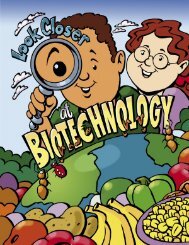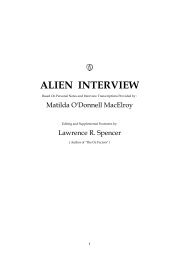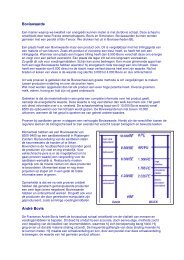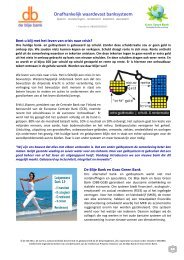De verborgen gevaren van vaccinaties - WantToKnow.nl
De verborgen gevaren van vaccinaties - WantToKnow.nl
De verborgen gevaren van vaccinaties - WantToKnow.nl
Create successful ePaper yourself
Turn your PDF publications into a flip-book with our unique Google optimized e-Paper software.
Evidentie voor het feit dat het primair de elektro-activiteit is <strong>van</strong> de vaccins<br />
die schaadt<br />
Op 4-10-2009 ontving ik een interessant artikel – door de Italiaan Giuseppe del Giudice, die<br />
in dienst is bij Novartis, afdeling Siena Italia - dat aantoont dat ik inderdaad gelijk heb met<br />
mijn betoog dat het niet gaat om de toxiciteit <strong>van</strong> squaleen in vaccins, maar om de elektroactiviteit<br />
<strong>van</strong> stoffen in vaccins, zoals kwik, aluminium hydroxide en Span85. Met de<br />
publicatie <strong>van</strong> dat artikel probeert Novartis aan te tonen dat vaccins met squaleen niets<br />
gevaarlijker zijn dan andere vaccins. En daarin heeft Novartis dan deze keer inderdaad nog<br />
gelijk ook. Maar te gelijkertijd bewijst deze publicatie onomstotelijk dat alle vaccins met<br />
elektro-actieve stoffen tot dezelfde gevaarlijke effecten leiden. Ze zijn dus niet allemaal even<br />
veilig, maar allemala even gevaarlijk.<br />
Ik herhaal nog even de conclusie uit de redenering uit het vorige hoofdstuk:<br />
Uit deze redenering volgt dat neurodegeneratieve aandoeningen zoals GBS (dat vrij snel<br />
optreedt) en multiple sclerose (MS) dat meestal een wat langzamer en chronischer<br />
verloop kent, beide kunnen worden veroorzaakt door <strong>vaccinaties</strong> die al of niet squaleen<br />
bevatten, maar wel altijd een elektro-actieve stof zoals Thimerosal, aluminium en/of<br />
Span85 (al of niet in MF59).<br />
Ook mentale retardatie en achteruitgang <strong>van</strong> cognitieve vermogens kunnen worden<br />
veroorzaakt door deze <strong>vaccinaties</strong> omdat de communicatie <strong>van</strong> hersencellen onderling –<br />
vaak progressief – wordt benadeeld.<br />
<strong>De</strong> inhoud <strong>van</strong> het reeds genoemde artikel betreffende de adju<strong>van</strong>t MF59<br />
Ik geef nu eerst even de Introduction <strong>van</strong> het artikel weer:<br />
[…] Squalene is a triterpenoid hydrocarbon oil (C30H50) produced by plants and is present<br />
in many food. Squalene is also produced abundantly by human beings, for whom it serves as a<br />
precursor of cholesterol and steroid hormones. It is synthetised in the liver and the skin,<br />
trnasported in the blood by very-low-density lipoproteins (VLDL) and low-density<br />
lipoproteins (LDL), and secreted in large amounts by sebaceous glands.<br />
Since it is a natural component of the human body and is biodegradable, squalene has been<br />
used as a component of vaccine adju<strong>van</strong>ts. Onde of these adjuvats is MG59, an oil-in-water<br />
emilsion developed by Chiron. MF59 has been shown in various preclinical and clinical<br />
studies to significantly enhance the immuune response to a wide variety of vaccine antigens.<br />
Mf59 is a part of an influenza sununit vaccine which has been licensed in various European<br />
countries since 1997. More than 20 million doses of this vaccine have been given, and it has<br />
been shown to have an excellent safety profile.<br />
The safety of vaccines with the MF59 adju<strong>van</strong>t has also been shown by various<br />
investigational clinical studies using recombinant antigens from hepatitis B virus, hepatitis C<br />
virus, cytomegalovirus, herpes simplex virus, human immunodeficiency virus, uropathogenic<br />
Escherichia coli, etc., with various age groups, including 1- to 3-day-old newborns.<br />
In 2000, antisqualene antibodies were reported to be present in the sera of veterans returning<br />
from the first Persian Gulf War with a series of symptoms diagnosed by the authors of the<br />
report as representing the so-called Gulf Wat syndrome. The conclusions of this work, based<br />
on Western blot assays, were severely criticized on technical grounds and were considered<br />
inconclusive y the Institue of Medicine.<br />
<strong>De</strong>spite the fact that vaccines given to veterans returning with Gulf War syndrome did not<br />
contain squalene and despite that fact that symptoms similar to those of the so-called Gulf<br />
war syndrome have been reported after several wars, including the American Civil War, we<br />
106







